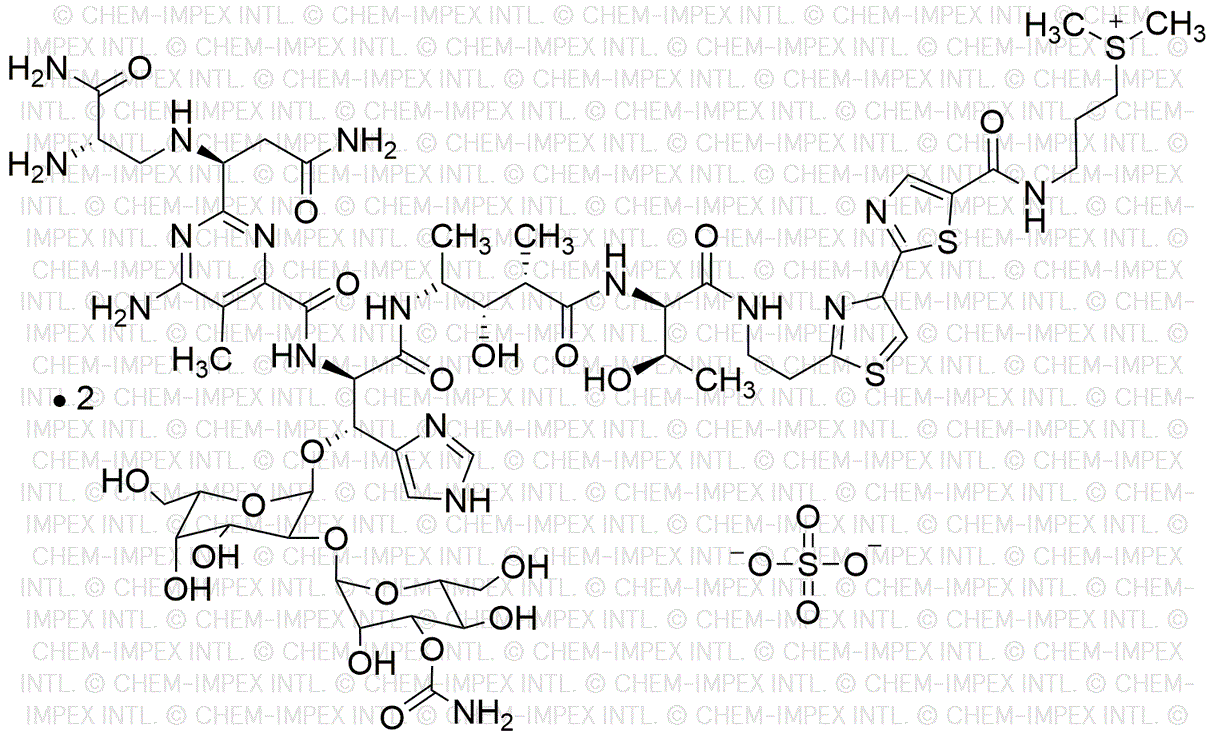Bleomycin sulfate from Streptomyces verticillus is widely utilized in research focused on:
- Cancer Treatment: This compound is primarily known for its role as an anticancer agent, particularly in the treatment of testicular cancer and Hodgkin's lymphoma. Its ability to induce DNA damage in cancer cells makes it a valuable tool in chemotherapy.
- Research in Antitumor Mechanisms: Researchers use bleomycin to study the mechanisms of tumor suppression and the cellular responses to DNA damage, providing insights that can lead to the development of new cancer therapies.
- Gene Therapy Applications: Its unique properties allow for the exploration of gene therapy techniques, where it can be used to selectively target and kill cancerous cells while sparing normal tissues, enhancing treatment efficacy.
- Biomedical Research: The compound is utilized in various laboratory studies to investigate cellular processes, including apoptosis (programmed cell death), which is crucial for understanding cancer biology and treatment responses.
- Combination Therapies: Bleomycin is often used in combination with other chemotherapeutic agents to enhance the overall effectiveness of cancer treatment regimens, allowing for lower doses of each drug and reducing side effects.
General Information
Properties
Safety and Regulations
Applications
Bleomycin sulfate from Streptomyces verticillus is widely utilized in research focused on:
- Cancer Treatment: This compound is primarily known for its role as an anticancer agent, particularly in the treatment of testicular cancer and Hodgkin's lymphoma. Its ability to induce DNA damage in cancer cells makes it a valuable tool in chemotherapy.
- Research in Antitumor Mechanisms: Researchers use bleomycin to study the mechanisms of tumor suppression and the cellular responses to DNA damage, providing insights that can lead to the development of new cancer therapies.
- Gene Therapy Applications: Its unique properties allow for the exploration of gene therapy techniques, where it can be used to selectively target and kill cancerous cells while sparing normal tissues, enhancing treatment efficacy.
- Biomedical Research: The compound is utilized in various laboratory studies to investigate cellular processes, including apoptosis (programmed cell death), which is crucial for understanding cancer biology and treatment responses.
- Combination Therapies: Bleomycin is often used in combination with other chemotherapeutic agents to enhance the overall effectiveness of cancer treatment regimens, allowing for lower doses of each drug and reducing side effects.
Documents
Safety Data Sheets (SDS)
The SDS provides comprehensive safety information on handling, storage, and disposal of the product.
Product Specification (PS)
The PS provides a comprehensive breakdown of the product’s properties, including chemical composition, physical state, purity, and storage requirements. It also details acceptable quality ranges and the product's intended applications.
Certificates of Analysis (COA)
Search for Certificates of Analysis (COA) by entering the products Lot Number. Lot and Batch Numbers can be found on a product’s label following the words ‘Lot’ or ‘Batch’.
Numéro de catalogue
Numéro de lot/série
Certificates Of Origin (COO)
This COO confirms the country where the product was manufactured, and also details the materials and components used in it and whether it is derived from natural, synthetic, or other specific sources. This certificate may be required for customs, trade, and regulatory compliance.
Numéro de catalogue
Numéro de lot/série
Safety Data Sheets (SDS)
The SDS provides comprehensive safety information on handling, storage, and disposal of the product.
DownloadProduct Specification (PS)
The PS provides a comprehensive breakdown of the product’s properties, including chemical composition, physical state, purity, and storage requirements. It also details acceptable quality ranges and the product's intended applications.
DownloadCertificates of Analysis (COA)
Search for Certificates of Analysis (COA) by entering the products Lot Number. Lot and Batch Numbers can be found on a product’s label following the words ‘Lot’ or ‘Batch’.
Numéro de catalogue
Numéro de lot/série
Certificates Of Origin (COO)
This COO confirms the country where the product was manufactured, and also details the materials and components used in it and whether it is derived from natural, synthetic, or other specific sources. This certificate may be required for customs, trade, and regulatory compliance.


